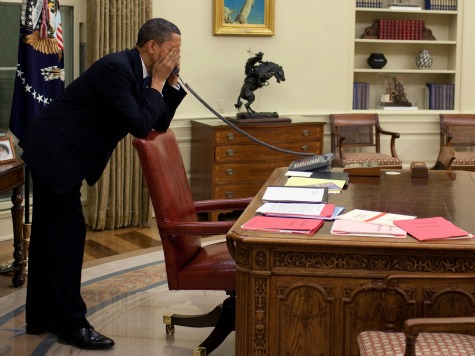
In an attempt to get out in front of startling GDP contraction, Democrats are scrambling to blame the unanticipated growth plunge on spending cuts, not President Barack Obama’s trillions in federal spending that have accelerated the need for tightening the nation’s fiscal belt.
Last quarter, the U.S. economy grew at 3.1%. On Wednesday, the Commerce Department announced that the economy experienced negative growth in the fourth quarter of 2012 by -0.1%. By comparison, China’s fourth quarter GDP was up 7.9%.
Democratic Party communications director Brad Woodhouse fired off a Twitter message quoting Paul Ashworth of Capital Economics calling the -0.1% growth rate “the best looking contraction in U.S. GDP you’ll ever see.”
And today on the White House blog, Obama’s Chairman of the Council of Economic Advisers Alan B. Krueger attempted to blame America’s first quarterly GDP drop in three-and-a-half years on Hurricane Sandy and slower defense spending “likely due to uncertainty stemming from the sequester.”
These comments telegraph Democrats broader strategy for the days ahead: use the GDP contraction to stoke fears that Republican calls to cut spending or aggressively negotiate the debt ceiling and sequester will drive growth down further.
Such messaging will be a hard sell. First, the negative growth figures come on the heels of Obama’s second inaugural address that boldly proclaimed the “economic recovery has begun.” Furthermore, if Krueger’s argument that cuts in defense spending triggered GDP to nosedive, how will President Obama defend his decision to slash defense spending by $487 billion over the next decade?
Even Politico has dubbed the negative growth numbers “Obama’s GDP headache,” calling it “bad news for Obama” because it contradicts the president’s “we’re-finally-roaring-back-narrative.”
CNBC analyst Rick Santelli was more blunt. “We are now Europe,” said Santelli. “When you act like Europe, you get growth rates like Europe.”
In January, top Federal Reserve official Charles Evans said the U.S. economy is expected to grow an anemic 2.5% in 2013. Today’s news will surely call even that modest growth projection into question.
The U.S. Department of Commerce defines the gross domestic product as “the output of goods and services produced by labor and property located in the United States.”

COMMENTS
Please let us know if you're having issues with commenting.